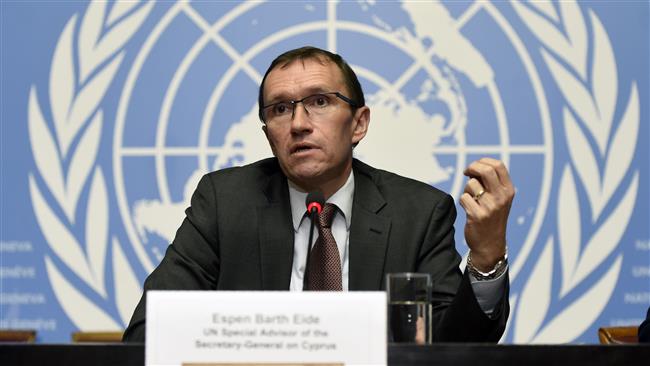Rival Cypriot leaders to exchange maps on reunified island
Rival Cypriot leaders will exchange competing maps that show the boundaries of the Turkish and Greek zones as they pursue reunification talks, says a UN official.
Special Adviser to the UN Secretary-General on Cyprus Espen Barth Eide hailed the move as "a very important moment."
Speaking during a press conference on the third day of UN-sponsored Cyprus peace talks in Geneva, he said the "historic" moment provides an opportunity for the two delegations to, for the first time, present their rival maps behind closed doors on Wednesday, with cartographers from both sides present.
The island country has been divided since 1974 into a breakaway Turkish-speaking north and an internationally-recognized Greek-speaking south following an intervention by Turkey, which came when a military coup was carried out by individuals who sought to unify the island with Greece.
Almost one decade later, Turkish Cypriots declared an independent state, which has only been recognized by Ankara.
Foreign ministers from Cyprus's so-called guarantor powers, Britain, Greece and Turkey, as well as new UN Secretary-General Antonio Guterres are set to join the talks at the UN headquarters in Geneva on Thursday to discuss post-unification security issues.
The UN envoy said the swapped maps would not be disclosed publicly. They "will be transferred to a vault and will only be in the possession of the United Nations" after being reviewed by Greek Cypriot President Nicos Anastasiades, Turkish Cypriot leader Mustafa Akinci, cartographers and the UN envoy, he added.
"We are on track," Eide said, adding, "We have dealt with some of the most difficult issues. We have touched upon almost all of them, we have solved many of them, and we are close to solving some other issues."
However, he declined to specify which issues had been resolved. "There's still work to do."
Top leaders from the European Union, which counts Cyprus as a member state, are also expected to take part in Thursday's talks.
"I really think that, without overdramatizing what is happening in Geneva, that this is the very last chance to see (a solution for) the island being imposed in a normal way," European Commission President Jean-Claude Juncker told reporters in Malta on Wednesday.
VIDEO | Yemeni forces repel US-British attack, down F-18 Jet
Iran’s capabilities vast; enemy’s ‘maximum pressure’ policies all failed miserably: Senior official
Iran’s economy grew 2.7% y/y in Sep quarter: CBI
VIDEO | Freelancers in Gaza strive to stay online amid genocide
Mikati demands Israel's withdrawal from south Lebanon
Yemeni army strikes Israeli military sites with drones
‘Clock ticking’: UNRWA slams unjustifiable killing of children in Gaza
BP to be sued in Britain for supplying oil to Israel










 This makes it easy to access the Press TV website
This makes it easy to access the Press TV website